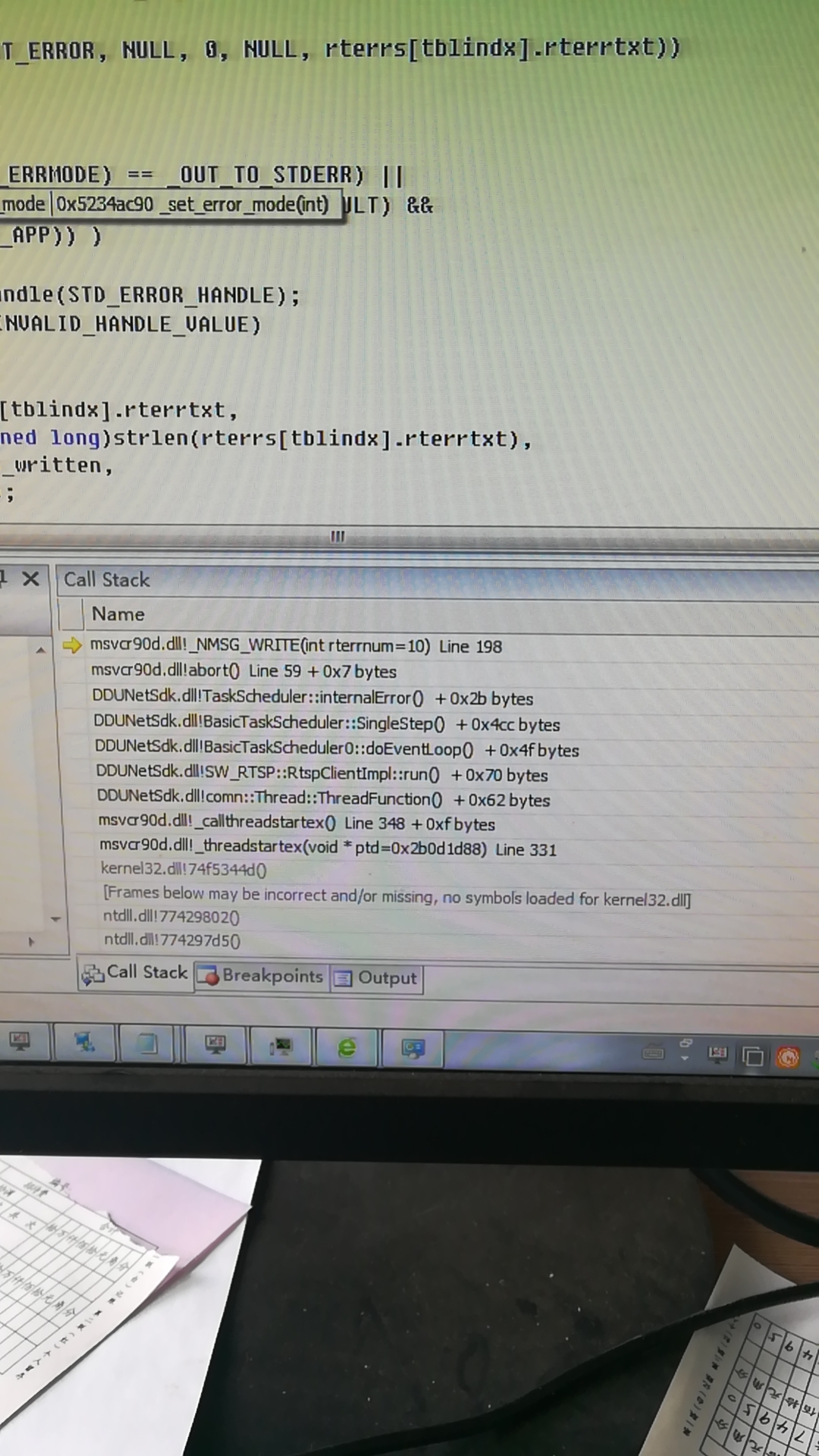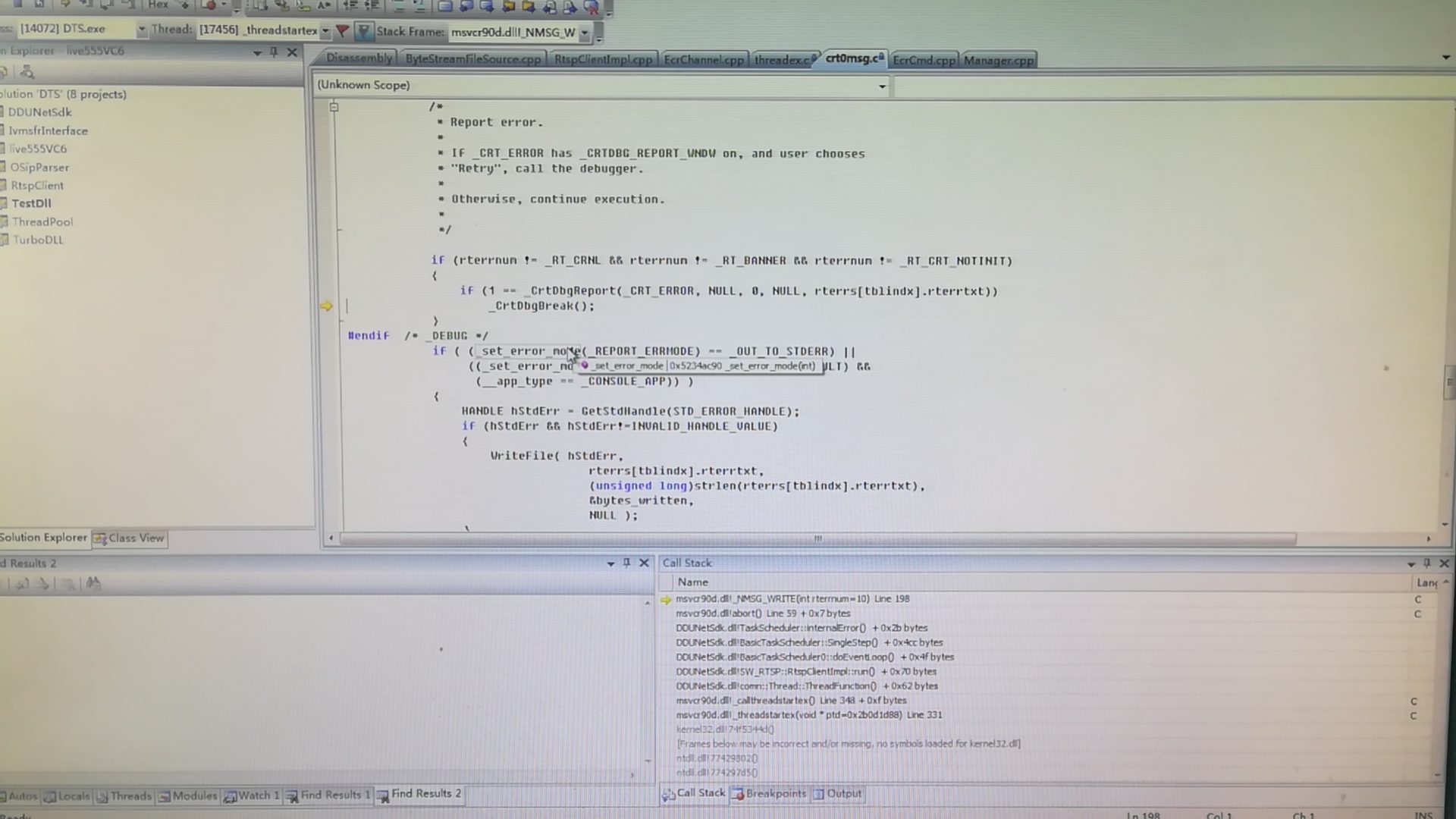采用live555,RTSP方式获取摄像机的视频流,我的客户端软件在多个摄像机中进行轮巡播放中,产生异常在BasicTaskScheduler::SingleStep(): select() fails。执行函数internalError(); 附图。 不知道是什么原因导致的?请大虾解惑。
void BasicTaskScheduler::SingleStep(unsigned maxDelayTime) {
fd_set readSet = fReadSet; // make a copy for this select() call
fd_set writeSet = fWriteSet; // ditto
fd_set exceptionSet = fExceptionSet; // ditto
DelayInterval const& timeToDelay = fDelayQueue.timeToNextAlarm();
struct timeval tv_timeToDelay;
tv_timeToDelay.tv_sec = timeToDelay.seconds();
tv_timeToDelay.tv_usec = timeToDelay.useconds();
// Very large "tv_sec" values cause select() to fail.
// Don't make it any larger than 1 million seconds (11.5 days)
const long MAX_TV_SEC = MILLION;
if (tv_timeToDelay.tv_sec > MAX_TV_SEC) {
tv_timeToDelay.tv_sec = MAX_TV_SEC;
}
// Also check our "maxDelayTime" parameter (if it's > 0):
if (maxDelayTime > 0 &&
(tv_timeToDelay.tv_sec > (long)maxDelayTime/MILLION ||
(tv_timeToDelay.tv_sec == (long)maxDelayTime/MILLION &&
tv_timeToDelay.tv_usec > (long)maxDelayTime%MILLION))) {
tv_timeToDelay.tv_sec = maxDelayTime/MILLION;
tv_timeToDelay.tv_usec = maxDelayTime%MILLION;
}
int selectResult = select(fMaxNumSockets, &readSet, &writeSet, &exceptionSet, &tv_timeToDelay);
if (selectResult < 0) {
#if defined(__WIN32__) || defined(_WIN32)
int err = WSAGetLastError();
// For some unknown reason, select() in Windoze sometimes fails with WSAEINVAL if
// it was called with no entries set in "readSet". If this happens, ignore it:
if (err == WSAEINVAL && readSet.fd_count == 0) {
err = EINTR;
// To stop this from happening again, create a dummy socket:
if (fDummySocketNum >= 0) closeSocket(fDummySocketNum);
fDummySocketNum = socket(AF_INET, SOCK_DGRAM, 0);
FD_SET((unsigned)fDummySocketNum, &fReadSet);
}
if (err != EINTR) {
#else
if (errno != EINTR && errno != EAGAIN) {
#endif
// Unexpected error - treat this as fatal:
#if !defined(_WIN32_WCE)
perror("BasicTaskScheduler::SingleStep(): select() fails");
// Because this failure is often "Bad file descriptor" - which is caused by an invalid socket number (i.e., a socket number
// that had already been closed) being used in "select()" - we print out the sockets that were being used in "select()",
// to assist in debugging:
fprintf(stderr, "socket numbers used in the select() call:");
for (int i = 0; i < 10000; ++i) {
if (FD_ISSET(i, &fReadSet) || FD_ISSET(i, &fWriteSet) || FD_ISSET(i, &fExceptionSet)) {
fprintf(stderr, " %d(", i);
if (FD_ISSET(i, &fReadSet)) fprintf(stderr, "r");
if (FD_ISSET(i, &fWriteSet)) fprintf(stderr, "w");
if (FD_ISSET(i, &fExceptionSet)) fprintf(stderr, "e");
fprintf(stderr, ")");
}
}
fprintf(stderr, "\n");
#endif
internalError();
}
}
// Call the handler function for one readable socket:
HandlerIterator iter(*fHandlers);
HandlerDescriptor* handler;
// To ensure forward progress through the handlers, begin past the last
// socket number that we handled:
if (fLastHandledSocketNum >= 0) {
while ((handler = iter.next()) != NULL) {
if (handler->socketNum == fLastHandledSocketNum) break;
}
if (handler == NULL) {
fLastHandledSocketNum = -1;
iter.reset(); // start from the beginning instead
}
}
while ((handler = iter.next()) != NULL) {
int sock = handler->socketNum; // alias
int resultConditionSet = 0;
if (FD_ISSET(sock, &readSet) && FD_ISSET(sock, &fReadSet)/*sanity check*/) resultConditionSet |= SOCKET_READABLE;
if (FD_ISSET(sock, &writeSet) && FD_ISSET(sock, &fWriteSet)/*sanity check*/) resultConditionSet |= SOCKET_WRITABLE;
if (FD_ISSET(sock, &exceptionSet) && FD_ISSET(sock, &fExceptionSet)/*sanity check*/) resultConditionSet |= SOCKET_EXCEPTION;
if ((resultConditionSet&handler->conditionSet) != 0 && handler->handlerProc != NULL) {
fLastHandledSocketNum = sock;
// Note: we set "fLastHandledSocketNum" before calling the handler,
// in case the handler calls "doEventLoop()" reentrantly.
(*handler->handlerProc)(handler->clientData, resultConditionSet);
break;
}
}
if (handler == NULL && fLastHandledSocketNum >= 0) {
// We didn't call a handler, but we didn't get to check all of them,
// so try again from the beginning:
iter.reset();
while ((handler = iter.next()) != NULL) {
int sock = handler->socketNum; // alias
int resultConditionSet = 0;
if (FD_ISSET(sock, &readSet) && FD_ISSET(sock, &fReadSet)/*sanity check*/) resultConditionSet |= SOCKET_READABLE;
if (FD_ISSET(sock, &writeSet) && FD_ISSET(sock, &fWriteSet)/*sanity check*/) resultConditionSet |= SOCKET_WRITABLE;
if (FD_ISSET(sock, &exceptionSet) && FD_ISSET(sock, &fExceptionSet)/*sanity check*/) resultConditionSet |= SOCKET_EXCEPTION;
if ((resultConditionSet&handler->conditionSet) != 0 && handler->handlerProc != NULL) {
fLastHandledSocketNum = sock;
// Note: we set "fLastHandledSocketNum" before calling the handler,
// in case the handler calls "doEventLoop()" reentrantly.
(*handler->handlerProc)(handler->clientData, resultConditionSet);
break;
}
}
if (handler == NULL) fLastHandledSocketNum = -1;//because we didn't call a handler
}
// Also handle any newly-triggered event (Note that we do this *after* calling a socket handler,
// in case the triggered event handler modifies The set of readable sockets.)
if (fTriggersAwaitingHandling != 0) {
if (fTriggersAwaitingHandling == fLastUsedTriggerMask) {
// Common-case optimization for a single event trigger:
fTriggersAwaitingHandling &=~ fLastUsedTriggerMask;
if (fTriggeredEventHandlers[fLastUsedTriggerNum] != NULL) {
(*fTriggeredEventHandlers[fLastUsedTriggerNum])(fTriggeredEventClientDatas[fLastUsedTriggerNum]);
}
} else {
// Look for an event trigger that needs handling (making sure that we make forward progress through all possible triggers):
unsigned i = fLastUsedTriggerNum;
EventTriggerId mask = fLastUsedTriggerMask;
do {
i = (i+1)%MAX_NUM_EVENT_TRIGGERS;
mask >>= 1;
if (mask == 0) mask = 0x80000000;
if ((fTriggersAwaitingHandling&mask) != 0) {
fTriggersAwaitingHandling &=~ mask;
if (fTriggeredEventHandlers[i] != NULL) {
(*fTriggeredEventHandlers[i])(fTriggeredEventClientDatas[i]);
}
fLastUsedTriggerMask = mask;
fLastUsedTriggerNum = i;
break;
}
} while (i != fLastUsedTriggerNum);
}
}
// Also handle any delayed event that may have come due.
fDelayQueue.handleAlarm();
}


